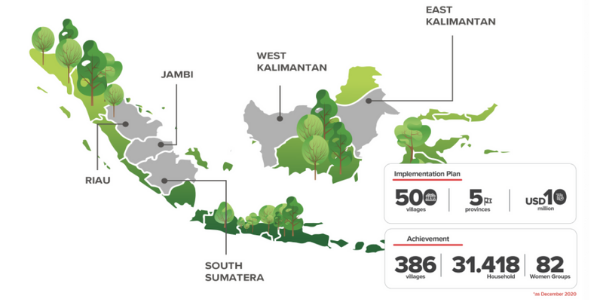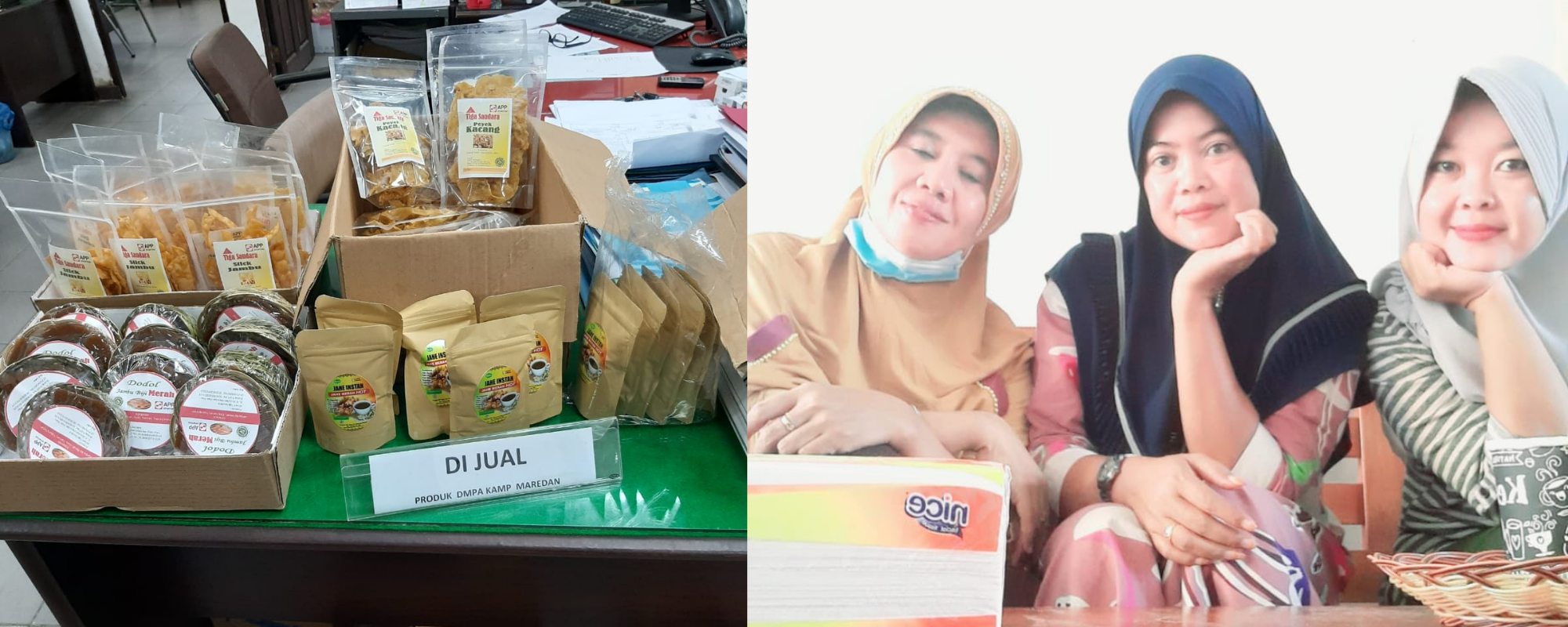Helping Communities Thrive
Harmful farming practices, such as using fire for land preparation, degrades the environment overtime and deforestation leads to heightened levels of carbon dioxide in the atmosphere, contributing to pollution and impacting the climate. The smog and ash created by the fires also affect the surrounding land and people.
Asia Pulp & Paper (APP) is a pulp and paper manufacturing company which delivers quality products to meet the growing global demand for paper, tissue, all over the world.
APP recognised the issue that deforestation is having on local communities and as part of their Sustainability Roadmap Vision wanted to put a stop to this.
People and the community are fundamental to the prevention of deforestation. APP recognise that ending poverty and other deprivations must go hand-in-hand with efforts to improve health and education, reduce inequality, empower women and spur economic growth – all while tackling climate change and working to preserve our oceans and forests. Therefore, Desa Makmur Peduli Api (DMPA), based on the Integrated Forestry & Farming System concept, was introduced by APP in 2015 to tackle the issue.
DMPA aims to lessen the pressure on forest land through providing alternative livelihoods for the communities living in and around forested areas. To ensure the sustainability of the program, it is voluntary and encourages ownership of the community as well as improving the capacity of village-owned institutions.
APP set out to have 500 villages join the program, and by the end of 2020, the program reached 386 villages with beneficiaries of more than 31,000 households and 82 Women’s groups, across Indonesia.
DMPA aligns with the Sustainable Development Goals 1, 2, 5, 8, and 13, which are core values to achieve through practices which can be replicated and scaled up to address existing gaps and constraints.
DMPA has made significant progress and benefited the communities in four significant ways:
Close to 200 farmer groups have been engaged and 100 farmers have been nurtured into successful entrepreneurs, serving concurrently as DMPA champions and agents of change. Nine cooperatives and 130 village-owned companies have also emerged from the program.
DMPA has made an impact to the local economy, creating employment opportunities and raising incomes among communities. These have also contributed positively to maintaining the economic wellbeing of these DMPA participants during the pandemic.
Importantly, DMPA has made an impact on the health & wellbeing of the community and the environment, by preventing and reducing harmful farming practices, such as using fire for land preparation.
DMPA has spurred other partnerships including the development of a guideline to develop a business model for the community, originating from the desire to replicate DMPA in other villages outside APP’s suppliers’ concession areas to support the government in local economic development while at the same time ensuring environmental protection.
Another key outcome of DMPA is improving access to market for micro, small & medium enterprises (MSMEs) during the pandemic. This was done through the provision of training on digital marketplace and business incubation.
APP collaborates with online marketplaces such as Shopee, Tokopedia and Blibli to provide training to the MSMEs on how to utilise the digital platforms to widen their market reach. While there are still challenges on accessibility, we are encouraged that a lot of the MSMEs that we nurtured have taken on the challenge to be digitally present. Additionally, we engage with the Indonesia Womenpreneur Community to provide business incubation programs to strengthen their business foundations, from managing the finance of their business and resources, to branding and promotion all the way to managing their customer base, to enable them to grow their business and doing so sustainably moving forward.
Also through the program, the participants learn how to utilize available resources, like spices or plants, and turn them into more marketable products such as drinks and snacks. Additionally, we also provided kitchen equipment and financial support to help them develop their own business.
In our effort to improve lives, we have focused on community empowerment programs that deliver long-term and sustainable livelihood improvements. One such program focusing on women empowerment, in collaboration with the Martha Tilaar Group and supported by Indonesia Global Compact Network, aims to reach out to and train 1,000 women from communities in and around our concessions and mill operations by 2020. This aligns closely with the DMPA programme which promotes income diversification.
To-date, 1,600 women have been trained through the program, including 4 young women who received scholarships for formal training to be spa therapists and employment access to work in Martha Tilaar Group SPAs. The women who have received training come from 80 villages across 5 Provinces, and APP works in collaboration with local government and community groups to determine the eligible participants. The programme is so well known that we are receiving direct requests from women to participate in the programme.
Support does not end following the training. Ongoing mentoring is provided, particularly in selling products and access to markets. The increase in income for these women is one of the biggest advantages to the local community, which makes it appealing for more women to enrol.
Soleha is one of APP’s participants from Siak regency, Riau, who has benefited from this program by making guava-based snacks. “The DMPA program inspired us to create some innovation from guava,” she said.
Guava has always been popular in Soleha’s village, but the people usually only consume it as it is. For a change, she turns the fruits into glutinous fudge (known as dodol in Asia) which is now one of Riau’s best selling snacks.
Consumers love her guava dodol. So, she employs 20 other homemakers to meet the increasing demand. Now their small business makes around USD 210 on a monthly basis.
Suryani has another story to tell. Instead of guava, her product innovation is made of red ginger (Alpinia purpurata). Red ginger is famous as a spice with many health benefits, so Suryani was inspired to make herbal drink products out of it.
“The program helps us with cooking equipment and packaging devices. And they also teach us to design our packaging to attract the consumers,” Suryani explained. She now runs the business with other women in Tualang, Riau, and earns around USD 420 a month. This is another of Riau’s best souvenirs.
Soleha, Suryani, and other participants lead their way to entrepreneurship, from regular homemakers with no income to economically independent women. With this program, they manage to help increase their family income. We hope this collaboration will ensure a brighter future for many women across Indonesia and allow us to enable a sustainable tomorrow.




